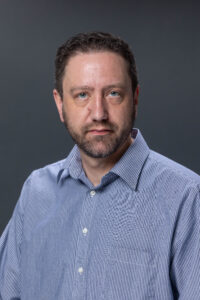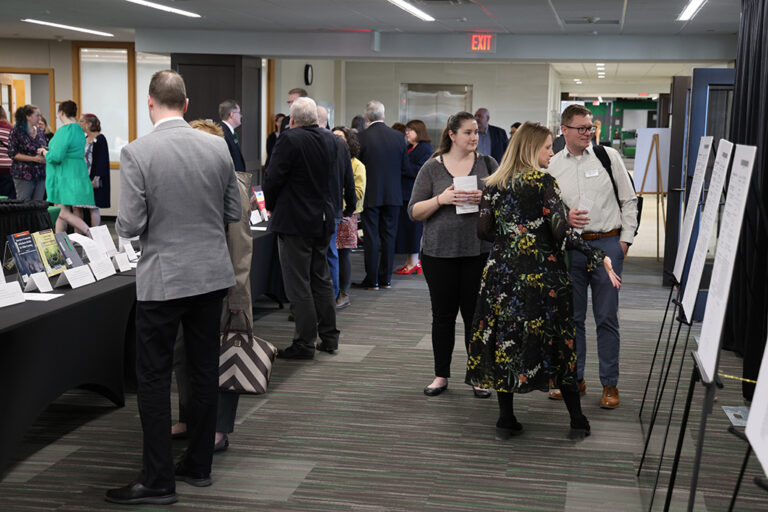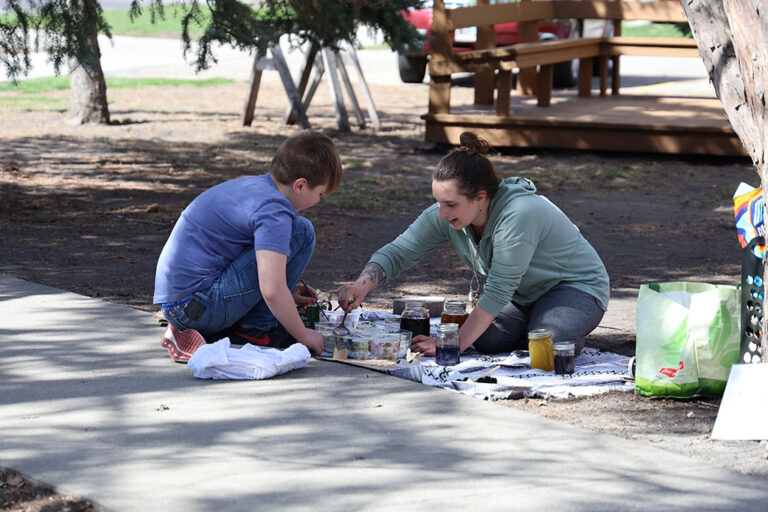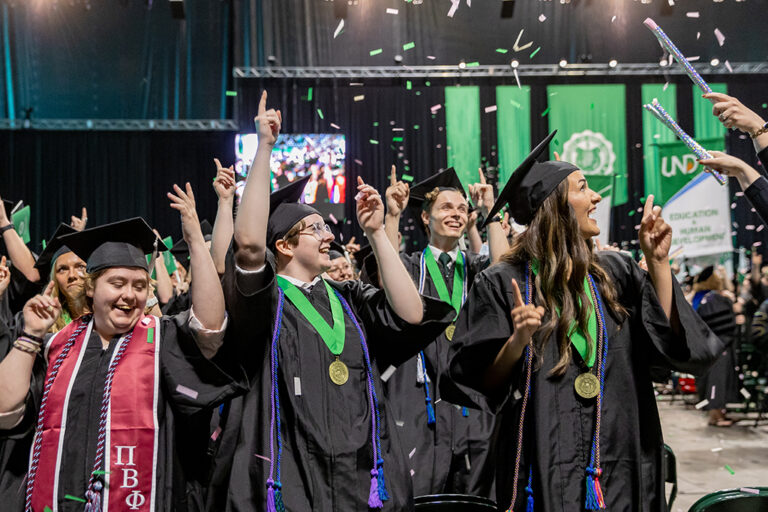From North Dakota and UND to ChatGPT
AI will impact humanity, but OpenAI co-founder and former Thompson, N.D., resident Greg Brockman says we can influence its course

Editor’s note: Below is a recap of the conversation between President Andy Armacost and Greg Brockman, the developer of ChatGPT, that took place on Tuesday. Sept. 26. Following the story is the full video discussion on You Tube, as well as a timestamped list of the questions that Armacost posed to Brockman.
UND Today also sat down for a separate discussion with Brockman; that conversation focused in part on Brockman’s growing up in North Dakota. The transcript of Brockman’s conversation with UND Today can be found on the website of UND Today.
****
These days, one doesn’t have to look too far or too hard to find news about artificial intelligence and the various computer programs the field has inspired.
UND President Andrew Armacost added to the ongoing dialogue when he sat down with Greg Brockman, the co-founder of OpenAI — the company that released the revolutionary AI program ChatGPT — on Tuesday, Sept. 26. ChatGPT transforms user instructions, called prompts, into detailed responses. Need a recipe for salsa? ChatGPT can help you. But it can also generate detailed essays on philosophical topics, discuss music and art and even generate code for other computer programs.
Brockman, a North Dakota native from Thompson, attended UND while still a student at Red River High School, after exhausting all the math classes Red River had to offer.
“The first class I took was Set Theory and Logic, with Dr. (Ryan) Zerr, and I was definitely the smallest person in the class,” Brockman said to audience laughter. “But I had a great time, and people were happy to work on problem sets with me.”
Those math, chemistry and philosophy classes (Brockman said he was particularly impressed by a ‘Philosophy through Film’ class with Prof. Jack Russel Weinstein) implanted concepts in his mind about creativity, and the idea that in order to build that which must come next, it is necessary to understand that which came before.
“I think the realization that to create something new is both the synthesis of understanding the things that came before you and the context they were in, but you also need that little spark of creativity to specialize, to make the connections that no one else has made … So that’s something that really stuck with me, and it’s a very non-technical thing, but I think it really underlies a lot of what I’ve done.”
Armacost and Brockman spoke for about an hour in the large ballroom of the Memorial Union. The 500-seat ballroom was filled to capacity with UND faculty, staff and students, as well as community members and high school students from across the state.
An overflow crowd watched the livestreamed discussion from the Social Stairs in the Memorial Union, and 2,500 more tuned in online.
Topics of discussion ranged from why Brockman wanted to pursue AI (he said a paper by philosopher Alan Turing, creator of the Turing Test of Machine Intelligence, inspired him to build systems that can solve problems people could not) to the idea of intergovernmental cooperation to make sure AI programs remain “within bounds.” To the latter end, Brockman suggested an entity not unlike the International Atomic Energy Agency.
At one point, Armacost asked about the role of traditional educators, should AI tools make their way into the classroom. Brockman responded that everyone remembers a key teacher who made a difference in their lives, who motivated them and captured their attention. But the problem is that one teacher with many students can’t be that teacher for everyone in the class, he said. AI, in contrast, could fill that role, and could be that teacher for an individual on any subject they wish to study.
AI applications, whether that be for teachers or doctors (taking on routine paperwork tasks so the physicians can focus on practicing medicine), inevitably will grow, Brockman said. Moreover, subsequent programs will become better and better. Society needs to guide that technology, to both prevent it from being used in undesirable ways, and enable it to help “everyone become a magician.”
“I think this technology is so desirable, it will be built with or without us,” Brockman said. “But what we can do, what we can all do, is help steer it. Help decide how we want to integrate it into society, how we want to work with it, how we want this to integrate into our lives.”
****
Timestamped list of discussion questions:
3:00: Tell us about your journey from Thompson, N.D., to where you are now.
7:45: What are your memories of being here at UND? A big shout-out goes here to Ryan Zerr, professor of mathematics, who was sitting in his office one day when you walked by and said, “Hey! I think I’d like to study something here.” At least, that’s my version of the story; what’s yours?
10:19: In your short-lived stay in college, you actually pursued three degrees that are actually an interesting collection. Tell us about that.
10:54: Back to AI: Tell us more about your motivation for ultimately pursuing deep learning and AI.
14:23: When you co-founded OpenAI, did you know that the technology that you were building would have the impact that it has had initially? Tell us about that vision that you had when you co-founded OpenAI.
17:50: When you look out over the next 10 years of AI, where are you expecting to see the next big jumps? And what about the steps toward “artificial general intelligence,” which many consider to be the ultimate goal of human-like intelligence with these machines?
22:23: Ray Kurzweil – the American computer scientist, author, inventor, and futurist – predicted the “singularity” (a system capable of human-level thoughts) would happen in 2045. Your thoughts?
23:45: A question about balancing the risks and the benefits. You do see a role for some kind of international, cross-governmental cooperation to keep things within bounds?
26:07: Let me pull back from the geopolitical context to college campuses. You have a room full of students and educators here; what are you thinking about in terms of the impact of AI on how we educate future students?
28:24: In previous interviews, you’ve talked about AI as a tool that can serve as an always-on teacher or tutor. If this happens, then what will the role be for traditional educators?
30:29: My final question: Actually, I defer to ChatGPT on this one. If ChatGPT could experience emotions, what do you think it would feel if it successfully helps someone? And conversely, when it makes a mistake?
(Editor’s note: In preparation for Greg Brockman’s talk with President Armacost, UND asked ChatGPT to help craft some questions for the president. The above question was one of the ones that ChatGPT suggested.)
33:01: Let me turn now to some questions from our students, who always ask the best questions. This first one comes from Dev, who’s a computer science graduate student and a 2014 graduate of Red River High School in Grand Forks. What are the important lessons you learned in your journey to get where you are today, coming from a small town in the Midwest? And what unique perspectives have you gathered along your experience in AI?
35:05: When you think about the most promising applications of AI in the near future, what do you think about? (This question comes from Lexi, who’s a finance and information-systems major.)
36:33: The next question was actually about the potential for AI in medical practice; this question is from Odelle, a nursing major from India. How about the use of AI in the development of therapies and new drugs?
38:04: This question comes from Madeline, who’s a commercial aviation major from Sequim, Wash.: Do you think that AI will degrade our value of man-made art such as poetry or painting?
40:07: Eve, an eighth grader from Fargo, asks about a topic that she did a science experiment on this year: Will we be able to differentiate between human-created or artificially created art or recipes, etc., and does that make a difference?
42:26: Andrew, an environmental management major from Penn Valley, Calif., asks: What do you think the difference is between human creativity and the way that ChatGPT creates text?
45:05: Jennifer, an English Ph.D. from Massachusetts, asks our final student question: What roles do creativity and hope play in your research?
46:27: I would like to turn our remaining time over to you. Is there a message that you have for people in the room here, in particular the students?



